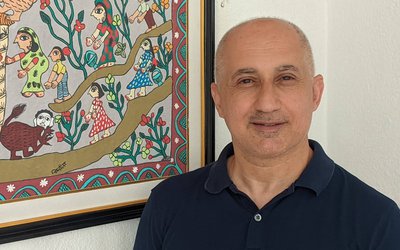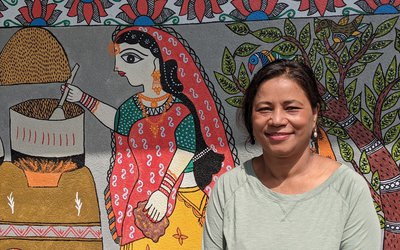
Having worked for over two decades in the civil society sector, ANN SVENSEN, Secretary General of IM Swedish Development Partner, was very much impressed while meeting with various stakeholders in the rural communities of Nepal. Secretary General Ann Svensen spoke to NEW SPOTLIGHT on various issues of development. Excerpts:
What are the priorities of the IM Swedish Development Partner in a country like Nepal?
First of all we are a people-centered and rights-based development organization. We worked with the civil society at all levels on capacity strengthening. We work through partners like civil society organizations here in Nepal. We work specifically in capacity building with women and children. Education for all is aa great opportunity but we are focusing on quality education.
How do you see the economic empowerment?
Economic empowerment is one of the important areas of development. Here we work together with other community based local organizations. We visited an organic farm and communities. We had also met with a group which had just worked in training in order to strengthening the capacity of women and make them capable to take the charge of their life. The training's aim is also to make them self-reliant. We are working with local partners on how to connect knowledge on economy and finance to create small businesses. The other aim was to generate awareness of how to make a voice.
How do you see the program?
Our partners are trying to make the program effective in the local context. What we do is to mobilize local partners to work in a holistic approach to empower individuals and mobilize more knowledge in their communities which will ultimately strengthen both the groups at the local level and also in an individual level.
IM Swedish Development Partners has been supporting the early earthquake recovery program. What plan does IM have to support another round of reconstruction?
We are a humanitarian development organization. But we do acknowledge that we are working in a country like Nepal where we have to have rapid response when there are things like big earthquakes occurring. The very day the earthquake occurred in Nepal we had annual general meeting of our organization in Sweden. Just a few hours after the earthquake, we reached Nepal. We had a very good fundraising campaign in Sweden. We also showcased that we are able to link relief work with the longer term perspective. We responded quickly as we received fund from individual donors and institutions. When the earthquake struck, we also applied for institutional funding and received quite a bit of it from institutions like Swedish Radio foundation.
What is important for IM Swedish Development Partners?
For us, it is important to show we are sensitive to the local circumstances. It is very significant with IM that we are quite sensitive. It is very important for us to take up a coordinative mechanism. We are assigned for the place where we could add value. You have recently visited some sites and met local communities.
What is your impression of meeting the people at the grass root level?
When you visit the very poor areas, what you encounter is a sense of hopelessness and people are tired and hungry. After our programs, people have realized that they can change something for a better future. I am very happy to say that we pick extremely relevant and professional partners that they know how to engage with the communities. They are very professional on social mobilization. That is what is needed. People are inviting me to be part of their program. I would like to come back in a few years and see what is actually happening and meet the very same people and children.
Have you observed some specific changes?
I met a girl who dropped out of school and is now going back there again. When I asked her why she had dropped out, she said that the distance of the school and quality of education were the reasons. For those poor parents who send their kids to school and invest in education, they see there is little return. Our local partners, together with teachers, authorities and local community, have started to bring the change, many dropped out girls are rejoining again. This shows that there is the need to ensure the quality of education to enroll more students. With the improvement of quality of education, everybody will be willing to come back to school.
Why is education for girl important?
All the researches that have been done globally show that Investing in women and giving them a tool not only impacts on life of particular woman, it has broader impacts as it makes difference in the life of her children, family and community as a whole. Ultimately, such women-centered programs will have economic impacts on the whole country. That means raising capacity of women in decision making or going to work will ultimately impact the capacity of the nation. It is not that we ignore male as we also think from a male perspective. However, we have to empower women because they are not empowered. According to the studies, investing in women's capacity building and decision making is important and education should be given high priority.
How is the IM IM Swedish Development Partner different from others?
There are many other organizations similar to ours'. However, one of the strengths of our program is that we follow the bottom-up approach. We are very sensitive to the field and we really want to strengthen the people. Since 1938, IM Swedish Development Partner has been working in 12 other countries. We earned a lot of experiences on what has worked and what has not worked. We are very patient partners.
How does IM Swedish Development Partner consider itself?
When you come to work as an international NGO, many see you as a donor. However, we consider ourselves as a partner, not a donor. We are not coming for a short project or a project for a few months as we have a long term goal and commitment. We have a strategy and strong monitoring system to see what has been going on. Working in the long term with local partners is the strength we have.
How is your experience in Nepal?
Of course, we haven't had an office in Nepal for a long time but we have been supporting here. In India, we have been supporting the program since the beginning of 1960s. We have the reputation of not jumping around. We are not donor driven and we are driven by the course and we want to accomplish something. We believe that a strong civil society can build democracy together with the government. In Sweden, we have a tradition to maintain very good relations with the government. It grows in decades and decades. We work in a partnership approach. We want to build partners and network and contribute. We want to accomplish something.
What is your rights-based development approach?
It is not complicated as it is also related to raising awareness. Our aim is to make people self-reliant with respect to their rights. If there is a health post, it is the right of the people to visit that health post. Health post is a very basic service of every human being. There are many schools with purpose to serve the interest of people. The aim of school is to enable children to get education and move forward. Some people may confront that the rights based approach means the provocative idea and want to challenge the government. That is not the case. Even the governments around the world have signed treaties and conventions on human rights. This is a global goal. The foremost thing is that we all are human beings. Everybody has the right to live as a human being regardless of anything. This is a very fundamental value everyone can share and it is a common goal. Human rights is about humanity. How we want to treat the people and how you want to be treated. If you look at human rights perspective, it is about humanity. This is how you want to treat the people and how you want to be treated as a person.
How is Swedish government helping IM Swedish Development Partner?
We are one of the 16 development stakeholders in Sweden to have an agreement with the Swedish Development Agency. However, we are still an independent NGO and we have our own strategy. We don't have to follow the Swedish Development Agency. We have now an agreement with Nepal for up to 2022 and we have a more operational agreement that runs three more years and we have to renegotiate. We are not just in the beginning and we want to expand our programs. We have also started collaboration with the European Union
- TANAHU HYDROPOWER PROEJCT: A Significant Achievement
- Apr 15, 2024
- AMBASSADOR HANAN GODAR: Sharing Pain With A Nepali Family
- Mar 30, 2024
- VISIT OF KfW AND EIB TO NEPAL : Mission Matters
- Mar 25, 2024
- NEPAL BRITAIN SOCIETY: Pratima Pande's Leadership
- Mar 24, 2024
- NEPAL ARMY DAY: Time To Recall Glory
- Mar 15, 2024
















